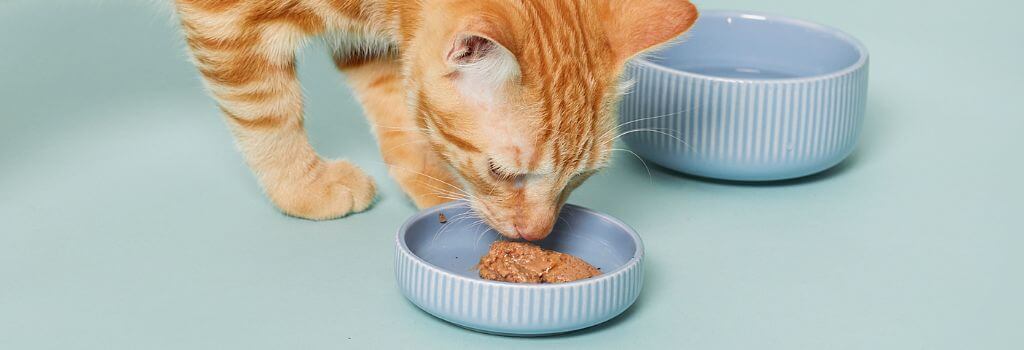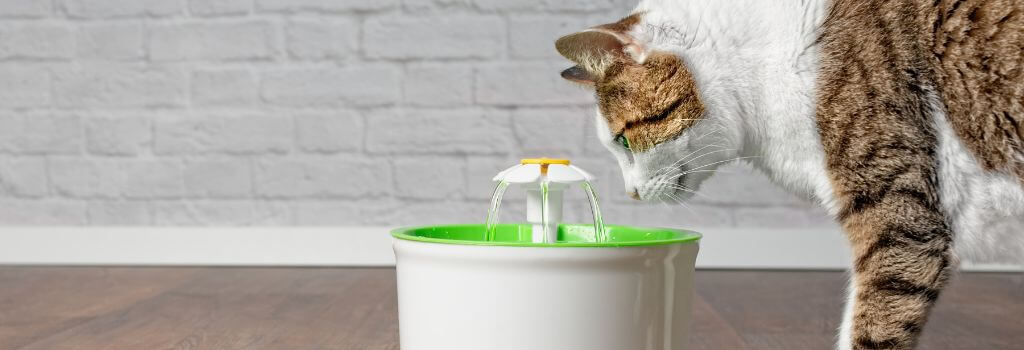Water is vital to a cat's health and well-being – it makes up about 60-70% of a cat's body composition, after all. Water and electrolytes play crucial roles in all of a cat's bodily systems and make sure everything from circulation to digestion runs smoothly. But, despite the importance of healthy water intake, many house cats are mildly dehydrated and not drinking enough to support good health.
Left unaddressed, dehydration in cats can contribute to a whole host of health problems, including urinary tract issues, kidney disease, and digestive disturbances. That's why it's so important for cat owners to recognize the subtle signs of dehydration, understand what causes it, and take proactive steps to encourage healthy hydration every day. In this guide, we'll break down all of that information and tell you exactly how to tell if your cat is getting the water intake that they need.
What Is Dehydration in Cats? And How Does It Happen?
Dehydration in cats occurs when a cat loses more fluids than they take in, preventing their bodies from maintaining a proper balance that is required for the normal functions of organs and bodily systems. The total amount of water in a cat's body is determined by their overall water intake, through drinking and eating food containing water, versus their excretion of water, which commonly occurs through urination, bowel movements, sweat, and breathing.
When cats lose enough fluid to the point of becoming dehydrated, they are also losing key electrolytes and minerals, like sodium, calcium, and potassium, that play important roles in tissue preservation and organ function. Electrolyte imbalances in cats can lead to several health complications and cause disruptions to muscle function, nerve signal processing, and heart rhythm.
In addition to electrolyte imbalances, some of the most common health issues that chronic or prolonged dehydration in cats can lead to include:
- Kidney damage or failure
- Digestive issues
- Low blood pressure
- Poor blood circulation
- Urinary tract problems
- Shock
- Organ failure
Cat dehydration can also exacerbate illness and worsen existing health conditions, so it is crucial for owners to stay on top of their cat's water intake and monitor them for any signs of dehydration to catch it early.
Common Causes of Dehydration in Cats & Kittens
There are a number of external factors and illnesses that can cause a cat to become dehydrated. These commonly include:
- Illnesses like kidney disease, diabetes, or hyperthyroidism
- Vomiting or diarrhea
- Excessive heat or lack of access to water
- Recovery from surgery or trauma
- Poor diet or inadequate moisture in food
- Nursing kittens without enough milk supply
Signs of Dehydration in Cats
Cats are masters of hiding pain, discomfort, and signs of illness, so spotting dehydration in cats can be tricky for even experienced owners. Dehydration can seem to manifest quickly, with a cat appearing mostly normal, but then suddenly exhibiting subtle signs that they aren't quite feeling like themself.
Common signs of dehydration in cats include:
- Decreased skin elasticity or skin tenting (To test for this, pinch the skin between the shoulder blades. If it doesn't snap back into place, dehydration is likely)
- Sticky or dry gums
- Increased heart rate
- Low energy, lethargy, or listlessness
- Constipation or small, dry stools that resemble pebbles
- Less frequent urination or darker urine
How to Tell if a Cat Is Dehydrated
With these signs of cat dehydration in mind, owners can check their cats for signs of dehydration at home by utilizing the following techniques:
- Perform the skin tent test – As mentioned above, pinch a small amount of skin at the scruff or between the shoulder blades and release it. If the skin doesn't return to its normal position almost immediately, your cat is likely dehydrated.
- Check the gums – Lift your cat's lip and feel the gums. If they're dry, sticky, or pale, that may indicate a lack of hydration.
- Observe behavior and litter box habits – Lethargy, loss of appetite, constipation, or infrequent urination are all red flags.
- Monitor water intake – Has your cat been drinking less than usual, or not at all? This alone is cause for concern.
If dehydration is physically noticeable through any of these tests, it's likely that it is already moderate or severe, and it's time to get your cat to the vet. The ill effects of dehydration on a cat's body can develop rapidly and can impact their long-term health, so it's important to keep an eye on your cat's water intake all the time and seek veterinary care if anything seems amiss or off from their regular habits and appearance.
How Much Water Do Cats Need?
According to Cornell University's College of Veterinary Medicine, cats need to consume approximately four ounces of water for every five pounds of lean body weight per day. With this hydration guideline in mind, the average 10-pound cat should drink about one cup of water per day to achieve proper water intake.

There are a few different ways that cats can meet their daily necessary water intake throughout the day. The most obvious of which is through drinking from bowls, fountains, and maybe even the dripping faucet from your kitchen sink. However, most cat owners don't realize that many cats also get some of their water from their food. Wet cat food contains approximately 70-80% water, meaning that cats that eat wet food every day are getting some of their necessary hydration from their meals. Alternatively, cats who only eat dry food or kibble miss out on this extra water intake and will need to drink more water than cats on a wet food diet to make up for the deficit.
How to Treat Dehydration in Cats at Home
If your cat is experiencing mild dehydration, and is still alert, eating, and not showing any severe symptoms or signs of distress, you can take some steps at home to help them rehydrate. The first thing you should do if you notice your cat is dehydrated is to encourage water intake. You can try to coax them to drink fresh water from a bowl or fountain or encourage them to eat food that has been wetted or contains water.
Can You Give a Cat Pedialyte?
You may be thinking, "Hydration supplements like Pedialyte work well for me and my family, will they work for my cat too?" Unflavored Pedialyte is generally considered safe for cats to drink in the event of dehydration, but there are a few concerns and administration best practices to be aware of before offering it to your cat.
The first major consideration with giving cats Pedialyte is the type of Pedialyte you are planning to give your cat. In order for it to be safe and not harmful to your cat, the Pedialyte must be unflavored and non-artificially sweetened. Flavored and sweetened varieties of Pedialyte may contain ingredients, like xylitol, that are harmful or toxic to cats. Some ingredients may even cause further stomach upset, leading to more vomiting and diarrhea, thus worsening the cat's dehydration and making the situation more serious.
Pedialyte should be used only as a short-term solution for mild dehydration in cats and should only be given in small quantities. Pedialyte is formulated for use by humans, so the electrolyte balance in the solution's formula isn't always ideal for cats. Too much sodium or potassium, which are key minerals contained in hydration solutions like Pedialyte, can be harmful in too high concentrations, especially in cats with kidney disease, heart issues, or other chronic illnesses. If you're unsure of how much Pedialyte is safe for your individual cat, get in contact with your veterinarian.
While Pedialyte can be a good option for supporting mild cases of dehydration in stable cats, it is not a cure or replacement for proper veterinary care. It can help replenish lost electrolytes, especially if your cat has been vomiting, has diarrhea, or hasn't been eating or drinking well, but if these ailments have been affecting your cat for more than a few hours, there are better treatment options than Pedialyte.
If your cat is severely dehydrated or exhibiting symptoms of stress or other illness, it can often be better to skip the Pedialyte altogether and head to the vet for injectable fluids. While promoting rehydration at home may seem easier and less stressful for you and your cat, it could do more harm than good if the degree of dehydration is severe enough. Oral hydration solutions like Pedialyte will not be absorbed as quickly as injectable fluids, leaving your cat at risk for bodily damage from dehydration longer.
Special Considerations When Dealing With a Dehydrated Kitten
Dehydration is especially dangerous for kittens, and it can escalate quickly, sometimes becoming life-threatening in a matter of hours. Unlike adult cats, kittens have immature immune systems, smaller body reserves, and are more vulnerable to fluid loss, so special care is needed when helping them maintain a proper fluid balance.
Kittens can be more affected by diarrhea, vomiting, and heat exposure than adult cats, so it's important to monitor them closely if they are experiencing gastrointestinal upset or have been exposed to warm temperatures without proper access to shade or fluids. Because dehydration in kittens is so serious and can greatly impact their fragile health, skipping home remedies and heading straight to the vet is the best course of action.

Keeping Your Cat from Getting Dehydrated
While dehydration in cats can be scary and stressful for owners, the good news is that it is completely preventable with a little forethought and planning. Cats are known to be notoriously picky creatures at times, and getting them to drink as much water as they need can often be easier said than done.
If you want to help encourage better hydration and help your cat develop healthy drinking habits, you can try:
- Offering wet food, which has a higher concentration of water than dry food or kibble
- Offering fresh water in multiple spots throughout your home
- Using a water fountain or filtered water if your cat is exceptionally picky
- Adding water to their food to increase the amount of water they get during meals
- Using ice cubes or frozen treats for playtime and rewards
- Keeping an eye on your cat's litterbox habits to watch for signs of dehydration in cats
Keeping your cat's water intake in check and preventing dehydration is a great way to support your cat's overall health and avoid issues with their kidneys, urinary system, and digestive system.
If you have questions and you'd like to reach out to us, you can call us directly at (781) 737-7820, or you can email us at info@duxburyanimalhospital.com. Don't forget to follow us on social media Facebook, Instagram.